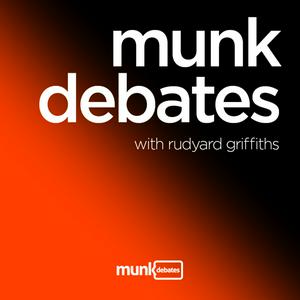Episódios Disponíveis
5 de 529
- Friday Focus: Why America's new national security strategy has Ottawa on edgeThe full length edition of this week's' Friday Focus podcast is being made available to all paying and non-paying subscribers. America's new national security strategy doctrine is getting a lot of attention and for good reason. Two main points stick out for Rudyard and Janice: the assumption that Europe is a civilization in decline, and that the western hemisphere belongs to the United States. Up until this point many of us accepted that in the last decade the world has shifted considerably with the rise of China. The post-Cold war unipolar period led by America as the superpower is over and we are witnessing a return to the great power competition between countries that defined the late 19th and early 20th centuries. What should concern Canadians in the strategy announced last week is the notion of spheres of influence, which suggests that North America belongs to the U.S. who will dominate and discipline neighbouring countries. Putin praised the doctrine which also implies that the other great powers - specifically China and Russia - are allowed their own spheres of influence. How should Canadians interpret this strategy? And how should it inform our foreign policy and defense strategy in the years ahead?--------33:42
- Munk Debate on the Two-State Solution: Opening StatementsOn this special podcast episode we are sharing the opening statements from the Munk Debate on the Two-State Solution which took place on December 3rd in front of an audience of 3,000 people at Toronto’s Meridian Hall. The debate resolution was Be it resolved, it is in Israel’s interest to support a two-state solution Arguing in favour of the resolution was former Israeli prime minister, finance minister, and mayor of Jerusalem, Ehud Olmert. His debate partner was Tzipi Livni, who served as Israel's justice and foreign minister and the country's chief peace negotiator in 2008 and 2014. Arguing against the resolution was the celebrated historian, former Israeli ambassador to the United States and deputy minister in the Prime Minister's Office, Michael Oren. His debate partner was Ayelet Shaked, who most recently served as Israel's justice minister and minister of the interior. As with all our live Munk Debates, the audience voted on this resolution prior to hearing the debate. Initially, 67% of attendees voted in favour of the debate motion, and 33% voted against. We did another poll after the debate to find out how many people had changed their minds once they listened to arguments from both sides. If you would like to watch or listen to the full debate go to www.munkdebates.com--------35:08
- Friday Focus: protesters fail to disrupt the Munk Debate on the Two-State Solution and Putin threatens Europe with warFriday Focus provides listeners with a focused, half-hour masterclass on the big issues, events and trends driving the news and current events. The show features Janice Gross Stein, the founding director of the Munk School of Global Affairs and bestselling author, in conversation with Rudyard Griffiths, Chair and moderator of the Munk Debates. Chair Rudyard Griffiths and managing director Ricki Gurwitz start today's show with a brief recap of the spirited Munk Debate on the Two-State Solution that took place at Meridian Hall on Wednesday night. Hundreds of protesters gathered outside to try to shut down the debate but were unsuccessful in their efforts, thanks in large part to the fantastic security team at Meridian Hall and the Toronto Police Services. In the second half of the show Rudyard and Janice talk about the high drama out of Europe this week: leaked memos of conversations between leaders revealing a deep distrust of the US and a desperation about how to support Ukraine at this moment. Putin has said he is ready for war with Europe. What does he mean by that? And after invoking the threat of nuclear weapons for over two years now are his warnings starting to ring hollow? And finally, where do we go from here? Is there any hope for a solution to this conflict? To support the Friday Focus podcast consider becoming a donor to the Munk Debates for as little as $50 annually, or $1.00 per episode. Canadian donors receive a charitable tax receipt. This podcast is a project of the Munk Debates, a Canadian charitable organization dedicated to fostering civil and substantive public dialogue. More information at www.munkdebates.com.--------19:20
- Friday Focus: Back to a Russia-Ukraine stalemate and Mark Carney gets a standing ovation in AlbertaTo find out how to purchase tickets to the Munk Debate on the Two-State Solution (or to access the livestream) go to www.munkdebates.com Rudyard and Janice start the show with a preview of next Wednesday's mainstage Munk Debate on the two-state solution. What kind of arguments are they anticipating from both sides? How will this discussion resonate in Israel? And why did we feel this was the right time to convene this debate? Rudyard and Janice then turn to the stalemate between Ukraine and Russia. After all of the negotiations neither side will agree to terms of territorial concessions. Should Zelensky accept a modification of the 28-point deal that would lead to the end of his political career? and what are Russia's long term designs for Ukraine and its relationship with the West? In the second half of the show Rudyard and Janice discuss the memorandum of understanding between Ottawa and Alberta in which both sides have agreed to work on approving a bitumen pipeline. We are witnessing a reset of Alberta's relationship with Ottawa and it is astonishing to watch Mark Carney, a liberal Prime Minister, get a standing ovation in Alberta. This agreement will anger British Columbia voters and indigenous nations in the area. Why is he doing this? Can he strengthen national unity? And if this pipeline makes it through all the approval processes and actually gets built, what will the demand for oil be in ten years? To support the Friday Focus podcast consider becoming a donor to the Munk Debates for as little as $50 annually, or $1.00 per episode. Canadian donors receive a charitable tax receipt.--------27:25
- Munk Dialogue with Andrew Coyne: Ottawa and Alberta agree to energy deal and why two-tier care is not the solution to Canada's healthcare problemsTo listen to the full episode consider becoming a donor to the Munk Debates for as little as $50 annually, or $1.00 per episode. Canadian donors receive a charitable tax receipt. Go to www.munkdebates.com to sign up. Rudyard and Andrew talk about this week's memorandum of understanding between Ottawa and Alberta that would provide premiere Danielle Smith with the approval to build a pipeline from Alberta, through BC, to western shores. Are more pipelines needed right now? And what about the country's commitment to lowering carbon emissions? Rudyard and Andrew engage in a debate on climate change and carbon taxes. In the second half of the show they turn to a leaked memo about the Alberta government's plan to allow physicians to practise in a mixed system and provide private care to patients willing to pay more. Will this help reform health care in Canada? Andrew argues that while there is room for private care, governments need to address the real problem here and move doctors away from fee for service.--------17:57
Mais podcasts de Arte
Podcasts em tendência em Arte
Sobre The Munk Debates Podcast
The Munk Debates podcast is an extension of the main stage events - in subject, speaker selection, tone and format. It will introduce the iconic brand - and its engaging debates about significant issues of our time. Audiences will hear strong and passionate arguments from both sides of an issue so they will have enough information to make up their own minds about where they stand.
Sítio Web de podcastOuve The Munk Debates Podcast, Refeitório e muitos outros podcasts de todo o mundo com a aplicação radio.pt

Obtenha a aplicação gratuita radio.pt
- Guardar rádios e podcasts favoritos
- Transmissão via Wi-Fi ou Bluetooth
- Carplay & Android Audo compatìvel
- E ainda mais funções
Obtenha a aplicação gratuita radio.pt
- Guardar rádios e podcasts favoritos
- Transmissão via Wi-Fi ou Bluetooth
- Carplay & Android Audo compatìvel
- E ainda mais funções


The Munk Debates Podcast
Leia o código,
descarregue a aplicação,
ouça.
descarregue a aplicação,
ouça.




















